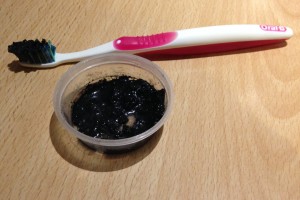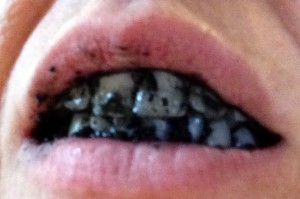If people want to know how to whiten teeth naturally, Activated Charcoal is usually mentioned as it really does work.

Activated Charcoal with a bit of Water
Activated charcoal or activated carbon is best known as an emergency decontaminant in the gastro-intestinal tract. It is often given to people who overdose on drugs or who accidentally consume something poisonous. This works due to its adsorption ability. Activated charcoal is most commonly made from coconut shells and is produced to have a very fine particle size, which increases the overall surface area. One 50 gram dose of activated charcoal has the surface area of ten football fields. The significance of this is that it has a very large area to bond with unwanted chemicals.
Activated charcoal whitens teeth because of these remarkable adsorption qualities, especially of tannins. Tannins are present in a lot of beverages e.g. wine, tea, cola etc which tends to stain our teeth.
A nice advantage is that activated charcoal can also be helpful in changing the pH in the mouth, and as such be helpful in preventing tooth decay, gingivitis (gum disease) and bad breath.
How to Use Activated Charcoal

Activated Charcoal for Teeth Whitening
- You can buy Activated Charcoal in loose powder or capsule form in health stores or online. Make sure it is from a trustworthy source and that it is made from wood or coconut and not petroleum–based.
- Be very careful as this powder stains everything! This includes clothes, shoes and even the grout between the tiles. Someone even suggested that you use it while showering. Don’t be too alarmed though, it doesn’t stain your teeth. If you prefer ‘ at home teeth whitening’ this is for you – as I wouldn’t suggest you try this method anywhere but home!
- You can dip a toothbrush into the powdered charcoal and place it in your mouth (being careful not to spill). Alternatively you can mix the powder with a bit of water and then place the black sludge in your mouth using a toothbrush. Gently brush it over your teeth and leave it for about 2 minutes. Spit carefully, as you really don’t want it all over the place. Rinse really well.
- You may need to brush your teeth again to remove all the black bits between your teeth.
- Most people find an impressive improvement in the shade of their teeth within a few days.
Please be careful when using Activated Charcoal for Teeth Whitening
In theory, the activated charcoal binds to everything in its path which may include stains, tatar and even bacteria and viruses. This is how it whitens the teeth. The concern is that it may also bind to the good bacteria that you need in your digestive system or medications your body needs. I would suggest that – if you choose to use this method – to make sure you don’t swallow it, and don’t use it every day. Another risk is that you may not know if the charcoal you use is safe.




Your caution that it will stain everything does not mention if it will stain tooth fillings. Is this a concern?
Hi Andy,
I refer more to the external staining of clothes, when the activated charcoal is still in its powder form. However, it we have not received any complaints to confirm that activated charcoal stain teeth. However to be on the safe side, first try it on a non-obvious place to see if there is any reaction to your specific fillings.